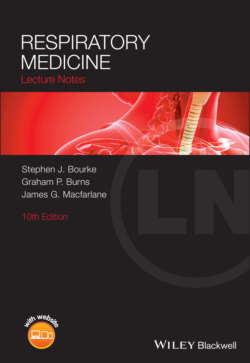Читать книгу Respiratory Medicine - Stephen J. Bourke - Страница 46
Cough and sputum
ОглавлениеCough begins with closure of the vocal cords; this allows the forced contraction of the abdominal muscles and bracing by the intercostal muscles to generate a large positive pressure within the thorax. Sudden opening of the vocal cords then results in a forceful expiratory blast. The expiratory flow rate produced is much greater than that during voluntary forced expiration; the resultant shearing forces are particularly effective at removing secretions or inhaled solid material. When the vocal cords cannot be opposed, cough is much less effective and its character is quite different (see discussion of bovine cough later in this chapter).
Cough is a protective reflex provoked by physical or chemical stimulation of irritant receptors in the larynx, trachea or bronchial tree. It may be dry or associated with sputum production. The duration and nature of a cough should be assessed, and precipitating and relieving factors should be explored. It is important to examine any sputum produced, noting whether it is mucoid, purulent or bloodstained, for example. Cough occurring on exercise or disturbing sleep at night is a feature of asthma. A transient cough productive of purulent sputum is very common in respiratory tract infections. A weak, ineffective cough that fails to clear secretions from the airways is a feature of bulbar palsy or expiratory muscle weakness, and predisposes the patient to aspiration pneumonia.
Cough is often triggered by the accumulation of sputum in the respiratory tract. Chronic bronchitis is defined as cough productive of sputum on most days for at least 3 months of 2 consecutive years. Bronchiectasis is characterised by the production of copious amounts of purulent sputum. A chronic cough may also be caused by gastro‐oesophageal reflux (with or without aspiration), sinusitis with postnasal drip and, occasionally, drugs (e.g. ACE inhibitors). Violent coughing can generate sufficient force to produce a ‘cough fracture’ of a rib or to impede venous return and cerebral perfusion, causing ‘cough syncope’.
